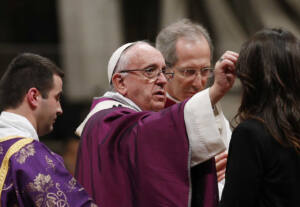
WelCom March 2023
In his Message for Lent 2023, 22 February–6 April, Pope Francis highlights the relationship between the Lenten journey and the synodal journey, which are both rooted in tradition and open to newness.
Christopher Wells, Vatican News
Personal and ecclesial ‘transfiguration’ is the goal of the ascetical journey of Lent, and similarly of the synodal process, writes Pope Francis in his Message for Lent 2023.
The message, signed on the Solemnity of the Conversion of St Paul and released on Friday, 17 February, bears the title ‘Lenten Penance and the Synodal Journey’.
Our Lenten journey is synodal
Pope Francis takes his inspiration from the Gospel account of the Transfiguration, proclaimed each year on the Second Sunday of Lent [see Gospel Reading and Reflection, p 17]. As with the chosen disciples at the Transfiguration, Jesus ‘takes us with Him to a place apart’ during the season of Lent.
‘Lenten penance,’ he writes, ‘is a commitment, sustained by grace, to overcoming our lack of faith and our resistance to following Jesus on the way of the cross.’
This requires effort, sacrifice, and concentration, which are also requirements for the Synodal Journey; and therefore we can say that ‘our Lenten journey is “synodal” since we make it together along the same path, as disciples of the one Master.’
‘Both in the liturgical journey and in the journey of the Synod, the Church does nothing other than enter ever more deeply and fully into the mystery of Christ the Saviour.’
Helping us understand God’s will
Like the journey of the disciples up Mount Tabor, Pope Francis acknowledges that the synodal process can seem arduous and lead to discouragement.
Yet, he says ‘what awaits us at the end is undoubtedly something wondrous and amazing, which will help us to understand better God’s will and our mission in the world.’
Pointing to the appearance of Moses and Elijah – representing the Law and the Prophets – at the Transfiguration, Pope Francis says, ‘In a similar way, the synodal journey is rooted in the Church’s tradition and at the same time open to newness.’ He explains that ‘tradition is a source of inspiration for seeking new paths and for avoiding the opposed temptations of immobility and improvised experimentation.’
Listening and daily effort
In order to reach our goal of personal and ecclesial transformation or conversion, Pope Francis proposes two paths inspired by the Transfiguration of Jesus.
The first is listening to God’s Word and to our brothers and sisters. The Pope reminds us that listening to Christ often takes place in listening to our brothers and sisters in the Church.
The second path involves facing the reality of the daily struggles of life, without getting caught up in extraordinary events and experiences. Pope Francis reminds us that neither Lent nor the synodal process are ends in themselves, but are leading us to the experience of Easter.
‘Let us go down then, to the plain,’ the Pope says in conclusion, ‘and may the grace we have experienced strengthen us to be ‘artisans of synodality’ in the ordinary life of our communities.
Source: Vatican News
Lent is upon us: ‘Believe in the Gospel’
Ash Wednesday opened the 40-days Season of Lent, emphasising both our equality before death and the possibility of doing good during our earthly life.
By Dominique Greiner
We enter the season of Lent [Ash Wednesday, 22 February] with the rite of the imposition of ashes on our foreheads… The two formulas to choose from that ceremony deliver its meaning.
‘Remember that you are dust and to dust you shall return’ (Gen 3, 19). The imposition of ashes reminds us of our human condition. We are transients, pilgrims on this earth. In this, we are all equal: no one can claim to be superior to others. This simple reminder is beneficial: it puts everyone in their place.
At the same time, knowing that we are all mortals has something soothing about it: ‘Can any of you, however much you worry, add a single cubit to your span of life?’ asks Jesus (Lk 12, 25). It is useless, therefore, to make all kinds of efforts in the belief that we can escape our mortal condition. On the contrary! If our time is short, let’s go to the essentials! Is this not what the second formula used in the Liturgy of the Ashes tells us: ‘Repent and believe in the Gospel’ (Mk 1, 15)?
This call to conversion can be understood as an invitation to accept and fully inhabit our finite condition. It’s a condition that Christ freely embraced by becoming ‘as human beings are’ (Phil 2, 7).
During his earthly life, Jesus never ceased to show that human finitude does not prevent us from behaving as good people. The Gospel is therefore an invitation to do the same by using our capacities to do good. They are capacities that come from God and that we discover and maintain through prayer, fasting and sharing. Happy Lenten journey!
Dominique Greiner, of France, a moral theologian and Assumptionist priest, is a senior editor at La Croix.
Source: La Croix
The New Zealand Bishops’ National Liturgy Office has prepared substantial parish and personal Lent resources, as well as a link to the important Caritas Aotearoa Lenten Appeal.The resources are online at https://www.nlo.org.nz/news-and-events/media-releases/lent-week-one-2023/